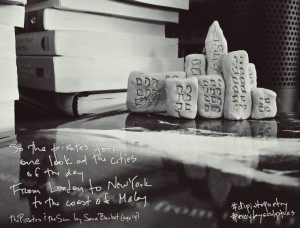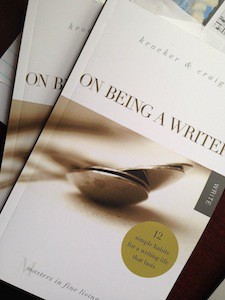The day after I completed an intensive project, I went upstairs and baked.
I am not a baker. I am not even on speaking terms with my kitchen much of the time. But after months of intensive work, mostly digital, in front of a computer screen and a microphone with my keyboard, mouse and Wacom tablet and stylus practically extensions of my hands, the prospect of making tiny orange spirals fall from the skin of a ripe Clementine as I scraped it across a zester’s tiny silver teeth kept me going during the last few arduous weeks of work.
So I baked. The Mediterranean yogurt cake turned out alright (I think). I felt almost immediately reinvigorated without even tasting it. I felt happy and ready to get back to work on a new project.
There’s a reason for this of course, besides having run across a tempting recipe. Brain researchers tell us that emotion and thinking are systemically connected with movement. That is, the ethereal is affected by the corporeal. And that movement is rather particular. Neuroscientist and psychologist Kelly Lambert has suggested that “moving our hands activates larger areas of the cortex than moving other parts of the body such as our legs or back muscles.”
I don’t know about you but I am all for having an active cortex, given that’s where our brain actually does its thinking work. Lambert argues that our ever-increasing use of screens and devices takes us away from vital physical, effort-driven activities which enhance our emotional well-being.
It is possible, then, that one of the most important tools we have as writers has nothing to do with whether we use a fountain pen or Blackwing pencil or if our paper is recycled or vellum or the never-ending question of paper at all versus digital. A prize tool is right at our fingertips. Or rather, is our fingertips.
So maybe you’re not a baker. Here are four other great ways to use your hands in your writing process:
1. Get your hands dirty in your garden
I don’t know if this is creepy or cool (I’m going to swallow hard and go with cool). Researchers from Sage Colleges in Troy, NY, discovered a particular bacteria found in soil can activate neurons that produce serotonin (that’s the chemical messenger that helps boost your mood and improve sleep patterns). You don’t have a garden? Perhaps the smaller commitment of a potted plant could give you a little place to play in your writing space. And if you’re all about that efficiency, consider killing two birds with one pie plate: go outside and make a mud pie.
2. Play with toys
When I was working a claims desk for an insurance company, I kept a fleet of Matchbox cars and trucks (and a sweet yellow school bus) lined up on my desk. While I talked with a policyholder about a car accident, I reenacted events on my desktop, moving the vehicles along the path they described, right up through the crash. I don’t have my cars anymore but I do have a small gyro wheel, that reminds me of a toy I always wanted, next to my desk. When I’m stuck I pick it up and imagine the wheel is like my mind going up and down over the rails until I find the thought I’m looking for. Research says block play is good for kids’ development. There’s reason to think it’s good for grown ups, too.
 3. Get some modeling clay
3. Get some modeling clay
I recently took my Every Day Sketches exercise a little farther and picked up a bucket of modeling clay. When I sense my activities are becoming too digital or need a creative transition between tasks during the workday, I sometimes dig out a little blob and make a simple (one could say crude) sculpture using a line from an Every Day Poems selection.
4. Write longhand
I am a big advocate of writing longhand. It has the obvious benefit of being disconnected from the Internet (assuming you put away your phone and tablet and move away from your computer). But writing longhand also involves cognitive processing differently than using a computer. A recent study found students who took notes longhand instead of on their laptop forced the brain to engage in more active listening, digesting and summarizing instead of merely “transcribing a lecture word for word without devoting much thought to the content.” University of Washington researcher Virginia Berninger found that grade school student who wrote essays by hand “wrote more words, faster, and expressed more ideas” than when they used a keyboard. She suggests that the difference lies in the sequential strokes that must be executed to form a letter, as opposed to hitting a single key to produce a letter. Another study found more advanced neural activity among kids who wrote letters out versus those who had only looked at letters. (And yes, these researchers believe the benefits extend to adults.)
When it comes to writing and creativity, your hands are good for much more than just carrying your writer’s toolkit around. So what about you? What do you do with your hands to get your brain moving?
For Further Reading;
Browse more Poets & Writers Toolkit
Check our our “Incidentally” series for more on block and other play strategies
Browse more Writing Tips
Photo by 白士 李, used with permission via Flickr. Post by LW Lindquist.
_______________________
Is your writing life all it can be?
Let this book act as your personal coach, to explore the writing life you already have and the writing life you wish for, and close the gap between the two.
- Earth Song Poem Featured on The Slowdown!—Birds in Home Depot - February 7, 2023
- The Rapping in the Attic—Happy Holidays Fun Video! - December 21, 2022
- Video: Earth Song: A Nature Poems Experience—Enchanting! - December 6, 2022



Laura (L.L.) Barkat says
How do I love this? Let me count the ways 🙂
Okay, I’m not really going to count. But I love this post. A few random thoughts…
-I literally start to feel a sense of needing to do something with my hands after a week of computer work. Almost like an itch.
-recently, I felt the hand “itch” so seriously that I took up my flute again one Sunday evening. It had a cascade effect. Both of my girls dragged out multiple materials (covering the whole dining room table!) and began constructing a batmobile thing :). Also, one of them started playing the guitar that night, and she’s never done that before
-once, I saw a guy throwing a basketball from hand to hand while he speed walked. The next time I went walking, I brought along bean bags and threw them from hand to hand while walking. I literally had this bizarre sensation that my body was learning something (what, I didn’t know) and that my brain was “growing.” Okay, I know that sounds bizarre, but it was a very keen sensation I had. So I share it, even though it sounds weird 🙂
-I wish, wish, wish that managers and educators everywhere would read this post and act in light of it for themselves and those they manage/teach
As for the post itself and how it’s written, I love that too 🙂 Fun, informative, funny 🙂
Will Willingham says
I think I was really most fascinated by the idea that hand movement stimulates greater cortex activity than other body movements. I mean, I knew that walking and exercising were important contributors to brain function. But I took this as a more general thing. That the hands are very specifically involved? Fascinating. Which is not, of course, to say that I will now sit on my chair all day and twiddle my thumbs. Though the research suggests that might be useful… 😉
Laura (L.L.) Barkat says
What really gets me about all this (particularly when it comes to the question of education) is that we shouldn’t need research to know it. We see the depression, the supposed “rebellion,” the failure of kids to learn in our uni-dimensional system, and we blame the kids. Why not listen to them? They tell us in so many ways that they need something different. But we compel and accuse and pile on more studying instead of hearing them.
Don’t get me started 😉
Megan Willome says
Yes and Amen.
One morning last fall during a daunting period of writing which involved lots of typing and phoning and Googling, I came to my journal and wrote a single sentence in longhand, “Must bake banana muffins or all is lost.” The need to use my hands in a different way was that strong. So, I obeyed. I went to the store, bought stuff, and baked banana muffins that afternoon. The conclusion: All was not lost.
Will Willingham says
Sometimes I think I should have given in to the baking before I got done with the project, but it didn’t work out that way. In fact I went through a whole pouch of Clementines that I bought to make the cake before I got that far, and had to buy more. 🙂
I live this: “Must bake banana muffins or all is lost.”
Will Willingham says
*love
Clearly I l don’t *live* this. 😉
Marilyn Yocum says
“Must bake banana muffins or all is lost.” LOVE IT!
Lane Arnold says
Quilting is my current hands-on playspace: colors, fabric, design, redesign, sew, rip out and resew, press, delight in, praying in stitches. So many ah-ha moments happen with fabric and spaciousness to create in a genre different from words at the computer. Dabbling with paints and Playdoh: good brain-movement food, too!
Will Willingham says
Lane, quilting is such a great thing. The textures and colors and actually making a tangible (and useful and beautiful) thing is exactly what I think these researchers are talking about. 🙂
Marilyn Yocum says
I’m giving the modeling clay and bean bags a try!
Callie Feyen says
I love this, LW. I don’t consider myself a baker, but the more I write, the more I bake. It’s satisfying to run my finger down the list of ingredients, line them up on my kitchen counter, follow the directions and an hour or two later something lovely is filling my kitchen. I even like the cleaning up part. The eating what I made part is pretty good, too.
And I ALWAYS write longhand. I once wrote LL Barkat a note, took a picture of it, and sent it via email because typing makes me sort of sad. I’ve been fantasizing about ways to blog longhand…..hmmmm, I wonder if you can help me with that? 🙂
Here’s one of my baking posts:http://www.calliefeyen.com/?p=3401
Will Willingham says
Callie,
I am so seriously not a baker. But there are times when I do it, and I do it intentionally, for the real benefits of it. Baking bread is particularly useful for me.
I am thinking the only real way you could blog longhand would be to write it out and then post a photo. (That has its own problems, of course, especially for viewing on mobile devices. 🙂 ) But it might be fun to do on occasion.